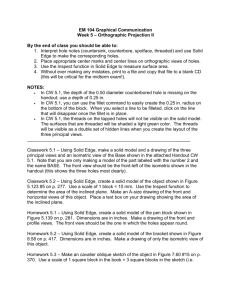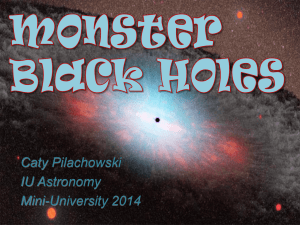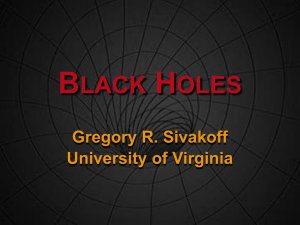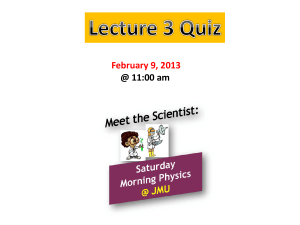File
advertisement
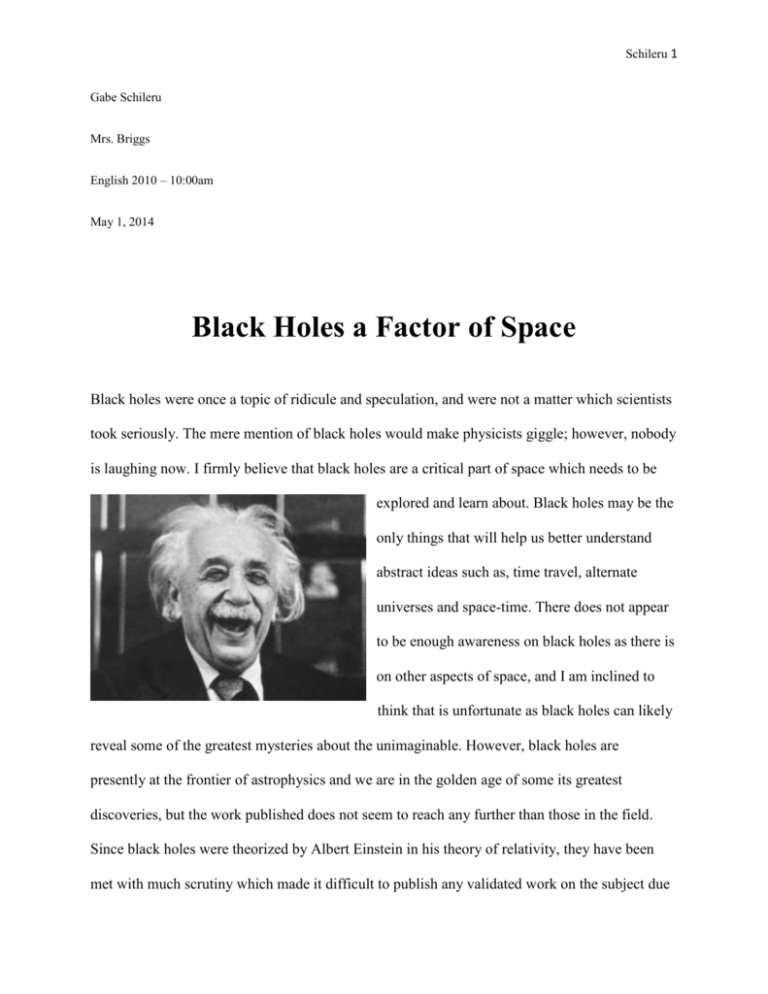
Schileru 1 Gabe Schileru Mrs. Briggs English 2010 – 10:00am May 1, 2014 Black Holes a Factor of Space Black holes were once a topic of ridicule and speculation, and were not a matter which scientists took seriously. The mere mention of black holes would make physicists giggle; however, nobody is laughing now. I firmly believe that black holes are a critical part of space which needs to be explored and learn about. Black holes may be the only things that will help us better understand abstract ideas such as, time travel, alternate universes and space-time. There does not appear to be enough awareness on black holes as there is on other aspects of space, and I am inclined to think that is unfortunate as black holes can likely reveal some of the greatest mysteries about the unimaginable. However, black holes are presently at the frontier of astrophysics and we are in the golden age of some its greatest discoveries, but the work published does not seem to reach any further than those in the field. Since black holes were theorized by Albert Einstein in his theory of relativity, they have been met with much scrutiny which made it difficult to publish any validated work on the subject due Schileru 2 to the contradictions posed by the physics at the time, it is just within the last three to four decades that black holes have been receiving proper analysis. A good example is made of the troubles physics has with black holes in a magazine article titled Hawking Offers up Black Hole Escape “The trouble is that quantum mechanics doesn’t get along with the other grand theory of physics, general relativity, making it difficult to understand situations in which both are relevant, such as black holes.” (par. 3 pp. 1). The subject of black holes can be easily dismissed as we are seemingly unaffected by them, and they are not things we come in direct contact with at any level. It could be safe to say that we as preoccupied beings by our daily lives are not inclined to wonder about the things larger than ourselves or care to understand them. In all actuality, black holes are some of the largest, most important objects in the universe, and common knowledge about this fact amongst the general population is long overdue. The general public should be able to realize that black holes are just as important to our existence as the sun, but this is not typically the case. Of the people I had a chance to speak with regarding subject of black holes, not one was aware the role they play in the universe and what black holes really mean to our existence. To begin to understand what black holes are and why they are important, it might be useful to first understand how they are created. There is no shortage of stars in our universe, and our sun is only one of trillions. Some stars are smaller than others, and others larger, much larger. We will want to focus on the larger stars for a moment as they are the ones which can be attributed to creating black holes. To help illustrate the size of a star needed to create a black hole, we can look at the size of our own sun. The diameter of our sun is about 865,375 miles, and the size of a star needed to create a black hole is closer to a billion miles in diameter. Schileru 3 Taking into consideration a star 1,000,000,000 miles across, the mass of such an object would be equally extraordinary. The gravity created by such an object would be incredibly immense. At the center of every star is a brew of nuclear fusion that creates an awesome amount of energy which pushes against the gravity created by the star. Eventually the nuclear activity at the center of a star will slow, and gravity begins to take over. Black Hole describes it saying “As nuclear fuels are exhausted in the core of a star, the pressure associated with their heat is no longer available to resist contraction of the core to ever higher densities.” (par. 4 pp.1). What happens next is one of the largest explosions known to exist. A super nova takes place typically emitting two enormous rays of gamma radiation on opposite ends blasting an immeasurable amount of energy through space; however, we need to take interest in what is taking place at the center of the star at the moment of its super nova. The density reached at the center of a super massive star once nuclear fusion seizes is known as super gravity and so great it essentially causes the star to collapse on itself creating a very dense point causing a hole to be punctured through the fabric of space known as space-time. The gravity Schileru 4 created by a black hole becomes so great that not even light can escape. The following equation for measuring the super gravity is provided by Speed for general rotating non-extremal black holes of super gravity “F1 = eϕ1−ϕ2−ϕ3 _ (_F1 − χ1F4)” (par. 3 pp.2). Published theories using advanced calculus on how black holes are created coupled with observable data brings irrefutable evidence they that black holes do indeed exist and are of great importance to us. Now that we have a basic understanding of what a black hole is, how they are created, and have established their existence, we can focus on why they are so important to us and our galaxy. We can pay tribute to planet earth for providing us a place to inhabit, and the sun for providing energy making life possible, but what about black holes? From what we know, black holes are big, scary destructive objects floating around somewhere out in space, so how are they important to us? The answer to this question will require us to consider a broader concept. We will need to expand and look at the galaxy as a whole, and to provide a more relevant case, we can look at our own Milky Way galaxy which holds millions of stars, planets and consequently; solar systems. Looking at a model of the Milky Way galaxy, you will notice the distinctive spiral shape seemingly revolving around a central focal point. Each one of those bright dots represents a star, and the closer we look to the center, it appears that the population and density of starts increases. A likely thought to consider is that this is simply how galaxies work. However it is Schileru 5 slightly more interesting than that. In fact, there is a massive gravitational force at the center of the galaxy causing the spiral effect common to most galaxies. Some black holes can measure hundreds, thousands, and even millions of miles across. The black hole at the center of our galaxy is one of the largest ever conceived, and is theorized to share the diameter of our entire solar system which would make it some billions of miles across. Cosmic bombshells says “We know that two distinct classes of black hole exist. There are stellar-mass ones, weighing in at anything between a few times and several 10 times the mass of the sun. These form when very massive stars collapse, and are thought to pockmark galaxies including our own, the Milky Way. Then there are "supermassive" black holes, weighing in at anything up to 30 billion solar masses. These are thought to form in the heart of most galaxies -- again, including our own -- when a dense star cluster or gas cloud collapses into a black hole and begins to pull in, or accrete, more material from its surroundings.” The super massive black hole at the center of our galaxy known as NGC 1277 holds everything together and is the one we can be most thankful for. If there were nothing holding our galaxy together, there would be no galaxy, which means no star clusters, no solar system, which means no us. Continuing to advance in the studies of astronomy and physics will enable us to understand more about black holes and their affects throughout our Schileru 6 surrounding universe. Although there is nothing we can do to control or utilize these wonders that are black holes, we can gain great amounts of knowledge from them that can open new windows and possibilities in the fields of physics and astronomy. Creating a larger awareness of black holes will result in a greater number of people becoming interested in this topic and possibly science as a whole. Learning more about black holes will advance our understanding of physics, and hopefully will result in benefiting humanity, as science often does. I believe that making black holes, and science in general, as a main focus for the general population will enhance the understanding of our cosmic surroundings. Instead of the magazines we find everywhere we go that are largely filled with pointless material, they should include subjects of science, and more specifically, black holes. Schileru 7 Works Cited Aron, Jacob. "Hawking Offers Up Black Hole Escape." New Scientist 221.2954 (2014): 12. Academic Search Premier. Web. 3 Apr. 2014. Chown, Marcus. “Cosmic Bombshells.” New Scientist 221.2955 (2014) : 41-43. Academic Search Premier. Web. 3 Apr. 2014. Chow, David D K, and Geoffrey Compère. "Seed For General Rotating Non-Extremal Black Holes Of Supergravity." Classical & Quantum Gravity 31.2 (2014): 022001-022011. Academic Search Premier. Web. 3 Apr. 2014. Moyer, Michael. "The New Black Hole Battle." Scientific American 310.4 (2014): 16. Business Source Premier. Web. 3 Apr. 2014. Schileru 8 Images http://consciouslifenews.com/tag/milky-way/ http://larresthoughts.blogspot.com/2009/09/modern-astronomy-and-scriptures-part-2.html http://scienceblogs.com/startswithabang/2010/12/08/dont-believe-in-black-holes-th/ https://student.societyforscience.org/article/black-hole-mysteries http://www.deism.com/einstein.htm
